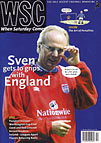 When Hereford went down to the Conference, Richard Butler was among their fans who despaired. But now he's starting to enjoy it
When Hereford went down to the Conference, Richard Butler was among their fans who despaired. But now he's starting to enjoy it
An air of cautious optimism prevailed among Hereford United fans prior to our first match in the Football Conference after 25 years of League football. We felt devastated by the events of May 3, 1997, when a 1-1 draw with Brighton on the final day of the season condemned us to the drop.
But surely our experienced professional squad would be able to overcome these part-timers and we would bounce back at the first attempt. Ninety minutes later we walked home in a daze. After playing them off the park, we had lost 2-1 to a one-dimensional Welling side with a 6’5” centre half and two Grant Mitchell lookalikes. They had scrapped for every ball and judging from the volume of noise coming from the visitors’ dressing room, you would think they had just won a cup final.
Hereford finished fifth in that first season, and it has been a similar story for all the sides who have been relegated from the League in recent times, with Doncaster, Scarborough and Chester taking time to adapt at this level. But with the prospect of a second promotion place, perhaps loss of League status will not be regarded in future as the drop into the abyss which most fans of League clubs imagine it to be.
However, most Conference supporters would probably agree that increased movement between the Conference and Third Division is now vital to the future of non-League football. Although a full time club hasn’t won the Conference since 1997, either Yeovil or Rushden look set to end that sequence this season and the only part-time side in the top four at present is Southport. But though the Conference is more professional than ever, one promotion place means that by about Christmas most clubs are playing largely meaningless fixtures.
Hereford United chairman Graham Turner announced following the 3-2 win over Hayes in January that the club would be unable to pay the players’ salaries that week: “The gate of 1,368 is not enough to pay the wages. Yet we are fourth in the table and probably having our best Conference season.” Seventeen points behind the leaders at the time of writing, crowds have inevitably dwindled. In 1996, by contrast, a run of six wins took us from the bottom half of the Third Division to the play-offs. A similar system in the Conference would be an ideal way to maintain interest and revenue.
Relegation was the catalyst for some long overdue changes at Hereford. We had heard rumours of the club’s financial difficulties but during that first season in the Conference the full story came out. It transpired that with the club already massively in debt, the board had borrowed £1 million from property developers, using the lease of the Edgar Street ground as collateral.
An Independent Supporters Association was formed with the objective of making inroads into the club’s debt mountain, and getting rid of the regime the fans blamed for the crisis. For the first time there was real anger about how far the club had been allowed to slide. Manager Graham Turner stepped in to buy out the previous chairman and effectively save the club from extinction.
Many younger fans had never seen a Hereford side playing non-League football before. Once we had negotiated the first hurdle of actually finding some of the more obscure grounds it made a pleasant change to outnumber and outsing the home fans and to see our team regularly winning away.
There are about six or seven teams in the Conference who have a realistic chance of promotion at the start of each season. Then you have the rest, the sides who get gates in the hundreds rather than thousands. They don’t aspire to be League clubs in the near future but they love to turn over the perceived “big boys”, ie the former League sides and Rushden & Diamonds, whose inability to get promoted has been a constant source of pleasure to many fans of other clubs.
Conference fans are generally a friendly bunch, and away fans are often welcome in the social club for a pre-match drink. Segregation is less common than in the League, and at places like Stalybridge Celtic the fans as well as the teams change ends at half-time.
New rivalries have been formed and old ones put on ice, although since Kidderminster and Cheltenham went up we have had to look as far afield as Chester for a Boxing Day fixture. Understandably, Hereford get less attention from the local media than they did as a League club, although the new Conference highlights programme on Sky should mean non-League football will get some year-round publicity, rather than just on FA Cup third round day.
Some Hereford fans might come over all nostagic about that annual trip to Spotland or Plainmoor, but personally I must admit I would rather see my team winning most weeks and aiming for promotion, instead of languishing in the Third Division.
From WSC 170 April 2001. What was happening this month